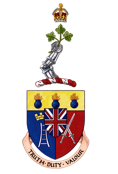David M. Last


The Springer Handbook of Military Sciences was launched in 2017 and is supported by the International Society of Military Sciences, a consortium of defence universities in small democratic countries. My responsibility is for Section VII on the Military Profession. Funded by the Norwegian Defence University College it is a free full-text online major reference work aimed at mid-career officers undertaking professional research, usually in the context of staff college. Chapters are posted continuously, and can be accessed here.
Working Group 9 of the International Society of Military Sciences was established in 2011. Further details can be found on ISMS Web Site. Current projects include the Handbook on Field Studies in Peace and Conflict aimed at cadets and young officers, and an effort to re-establish a web 2.0 site for sharing information for educational institutions. Links have been established with European Security and Defence College (ESCD), NATO Defence Education Enhancement Project (DEEP), the International Symposium on Development of Military Academies (ISoDoMA) and the recently formed International Association of Military Academies (IAMA) which addresses pre-commissioning institutions. We are collecting contributions for a special issue on higher military education.
“The Ideological Conflict Project (ICP) seeks to advance understanding of how beliefs, ideas and emotions influence behaviour during conflicts. Using methods drawn from the field of complexity theory, we confront the questions of why people believe what they believe, how their beliefs change, why beliefs are so often resistant to change, and how beliefs motivate violent conflict.” (Web site) My role in the project is to help researchers understand the needs of military professionals and to help translate the results of the project into tools and procedures that are useful from practitioners. I have used cognitive affective maps as a teaching tool with cadets in peace and conflict education, and I’m looking for opportunities to introduce the tools generated by the project into security education.
I have been involved in this working group since it was founded in 2009, and currently co-chair it with Marina Caparini of SIPRI. The ERGOMAS web site can be found here. Military, paramilitary, and police forces can be conceived as a continuum for the management of violence, with culturally specific rules and legal frameworks. Bringing military forces under rule of law in international peace support operations makes them more like a constabulary force. Conversely, the militarization of police using targeting to deal with domestic enemies can escalate violence. I am studying mixed military and police roles in international political economy. What do security professionals need to understand about political economy in order to execute their roles effectively given the changing nature of the state and its competitors - corporations and organized crime?
This is a privately hosted personal website. RMC, DND, and Government of Canada are not responsible for its content. Last updated July 2025.
David Last, CD, PhD
Associate Professor, Political Science
Royal Military College of Canada
Call: +1(613)532-3002

David M. Last
Phone: +1 1234 5678
Contact